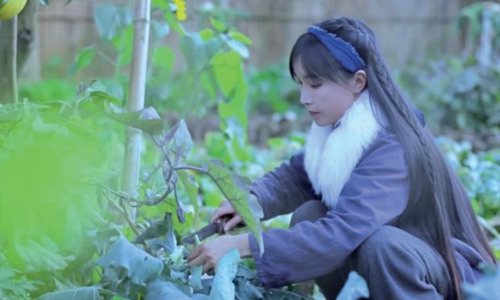
Video blogger Li Ziqi. Photo: screenshot of Li Ziqi's video
Li Ziqi, one of China's most popular vloggers, attracts over 11 million international subscribers on YouTube. She is famous for her mesmerizing videos of a countryside of self-sufficiency and simple beauty. But in a Wednesday report by VOA, she is taken as an example of how the Chinese government taps into the vast pool of talented cyber celebrities to generate soft power for the country.
The report made two absurd points: First, Li's success "has government support" and the Chinese government sees celebrities like Li as a potential resource that "needs to be harnessed and controlled;" second, even if with internationally renowned internet celebrities like Li, it's hard for China to win the hearts of citizens from other countries and gain soft power in light of "authoritarian rule at home" and "aggressive foreign policies abroad," or "wolf warrior diplomacy" dubbed by China critics in the West.
Nothing of a political nature can be found in Li's videos. She said in an interview that she "has full control of the content she wants to film." Foreign viewers are attracted by the leisurely Chinese rural sceneries in her videos and the inner peace they would feel when watching Li's tranquil and idyllic life on laptops. This is the charm of Chinese traditional culture.
Li presents the traditionally leisurely and fascinating life in Chinese villages. In her latest 18-minute video, "The life of okra and the bamboo fence," she filmed how she built a bamboo fence for her garden by herself, sowed and harvested okra and made it into dishes. Watching her, viewers, regardless of nationality, easily wish they could be happily living like that. Her popularity is nothing but a natural result, having nothing to do with "government support."
Her popularity will inevitably increase China's soft power. Joseph Nye, who coined the idea of soft power, has proposed three sources of a country's soft power, one of which is culture. He also said a lot of a country's soft power is generated not by government but civil society. Li's case is a vivid example of how China increases soft power through spontaneous efforts by Chinese civil society. However, some Westerners and media refuse to admit that.
For the West, only popular cultural products made by countries it deems not a threat represent soft power, otherwise, they are merely used as government propaganda, or will lead to no improvement in soft power.
India and China are both big Asian powers rich in traditional culture. But China is viewed as being less attractive while India is regarded as boasting tremendous soft power potential as the world's largest democracy. The main reason is that the West judges a country's soft power from the lens of its political system and ideology, as well as its geopolitical implication to the West.
The West refuses to admit China's increasing soft power. They, instead, argue China's soft power suffers as China has exerted so-called wolf warrior diplomacy worldwide. Is there anything wrong with China taking hard-line measures to counterattack in face of a US-led suppression and safeguard its own interests? Facing unwarranted accusations against China and a hooligan crackdown, why can't China defend its interests in an unequivocal way?
If China cannot protect its interests or is not strong enough, Chinese people like Li will be unable to live such a peaceful rural life. When China was a weak and poor country, rural life was not leisurely and idyllic like Li is living now. It was only full of hardship. But the West would rather appreciate the rural scenery of weak countries.
Some Westerners and media disparage Chinese personal content creators, saying they are controlled by the government, largely because they are afraid of the improvement of China's soft power. They probably hope that China could stay backward so that they can always maintain their psychological superiority. But China's soft power has been constantly on the rise, which stems from its attractive traditional culture, the spontaneous and creative promotion by Chinese civil society, as well as China's successful economic development. This is an unstoppable trend that the West has to face up to.
The author is a reporter with the Global Times. yujincui@globaltimes.com.cn



